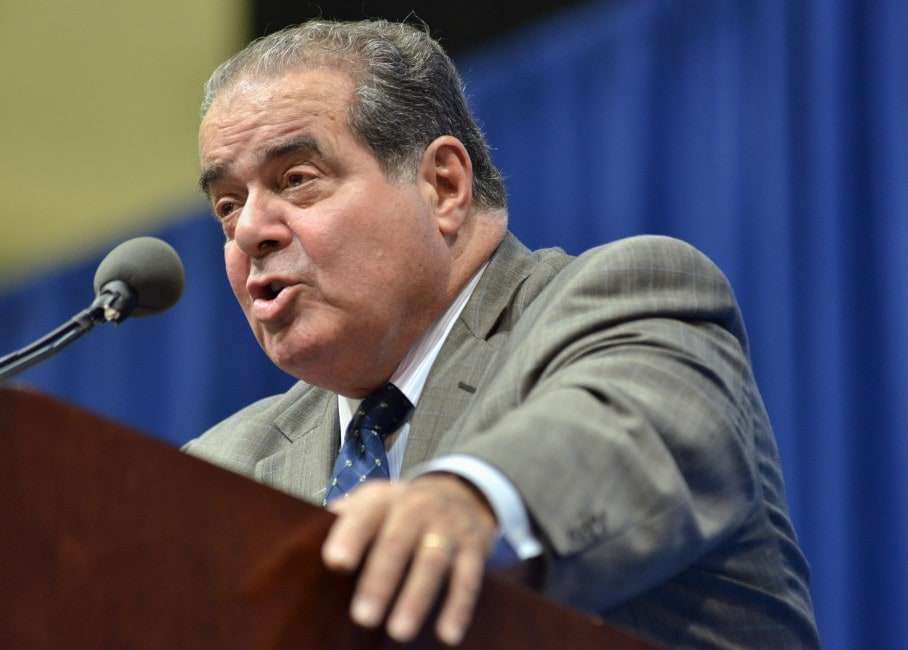The Volokh Conspiracy
Mostly law professors | Sometimes contrarian | Often libertarian | Always independent
On the ridiculous controversy over changing the name of the George Mason University School of Law (updated)

As a graduate of the George Mason University School of Law (GMUSL), I have watched with interest, and some dismay, at the controversy over the decision to rename the school the Antonin Scalia School of Law in response to a $30 million gift. A group of GMU faculty (from outside the law school) have objected to the name change and pushed for a Faculty Senate resolution opposing the move, over the objections of law school faculty, allegedly in the name of tolerance and academic freedom.
Naming gifts are common in academia, and no one bats an eye when a school is named after a donor or a progressive icon. There's no controversy over the renaming of the Pace University School of Law after liberal philanthropist and environmentalist Elisabeth Haub, and I can't recall any objection to naming a law school after the jurist who infamously filed an amicus brief cataloging social science research purporting to show women are weaker than men. But naming a school after one of the most important and consequential jurists of the past century is apparently a bridge too far for some on the leftist fringe.
Fortunately, it seems that saner heads may prevail. This week, The Post published an op-ed by two distinguished attorneys - former Bush solicitor general Ted Olson and former Clinton solicitor general Seth Waxman - defending the decision to rename the GMUSL after the late justice. A taste:
Aspiring lawyers will encounter Scalia's ideas for generations to come, determining for themselves whether to accept or reject his principles, theories and opinions. Whatever they decide, they will owe him a great debt for enriching the conversation on the Constitution and our legal system. It is fitting that a man who so profoundly influenced the law itself as well as its study should be recognized in this way for his achievements.
For its part, The Post branded the proposed name-change "polarizing," and worthy of broader debate, while recognizing the "hypocrisy" of some of the proposal's critics.
My co-blogger Todd Zywicki and Lloyd Cohen - two GMUSL professors - write about the hypocrisy and strange notions of tolerance embraced by critics of the name change in National Review:
We had thought that our combined 50-plus years as law professors had jaded us to the point where we could be surprised no more by the antics of academics, yet we were still unprepared for what came next: efforts by faculty in other departments of the university to derail the gifts and the renaming - all, ironically, raised in the name of "academic freedom." Faculty from unaffiliated departments, such as art history, "cultural studies," and others (notably excluding economics, mathematics, and the physical sciences), began a campaign in the Faculty Senate to pass a resolution urging the university administration and the State Council of Higher Education for Virginia to delay acceptance of the gifts. Why? The opponents have fired a scattergun of claims, but the truth is that this is a thinly veiled political assault on the law school because of a perception that the political center of the law school is not in keeping with the radical agenda taken as gospel by much of the faculty in the softer disciplines and allied offices in the university.
University President Angel Cabrera, to his credit, has been steadfast in support of the name change as well as to the university's commitment to academic freedom and viewpoint diversity. In a letter to the Faculty Senate, he wrote:
In a large and proudly diverse university like ours, it is not surprising that the opinions of an influential individual like the late Supreme Court Justice Antonin Scalia would generate a wide variety of reactions. I acknowledge and respect the fact that some of you find some of his opinions objectionable and even personally offensive.
Agreement with his views is, however, not the reason why we are renaming the law school for Justice Scalia. We are not endorsing his opinions on any specific issue. We are recognizing a man who served our country at the highest level of government for 30 years and who many experts of diverse ideological persuasions-from faculty colleagues in our law school, to his peers on the Supreme Court, to the president of the United States-consider to have been a great jurist who had a profound impact in the legal field. . . .
We must ensure that George Mason University remains an example of diversity of thought, a place where multiple perspectives can be dissected, confronted, and debated for the benefit and progress of society at large. Rejecting a major naming gift in honor of a U.S. Supreme Court Justice on the basis that some of us disagree with some of his opinions would be inconsistent with our values of diversity and freedom of thought.
It's nice to see that the president of GMU understands these principles, even if a majority of the GMU Faculty Senate does not.
UPDATE: The name change is now official after a unanimous vote of the State Council of Higher Education for Virginia cleared the way.
http://www.washingtonpost.com/video/national/four-major-cases-the-supreme-court-will-take-on-without-justice-scalia/2016/02/20/dae69320-d753-11e5-a65b-587e721fb231_video.html


Show Comments (0)